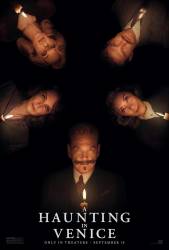Factual error: Poirot attends a Halloween party in Venice in 1947. Halloween was never publicly recognized as a holiday in Venice or Italy in general in the XX century, especially with the traditional pumpkin-centered iconography. One could argue that, for the most part, Poirot is attending a private party organized by an American soprano. But, besides how unlikely it would be for 1947 Catholic nuns to take part in such a pagan-themed event, there are scenes showing Halloween decorations in the streets of Venice far away from the party location, as if it were a public holiday and not a private gathering from an eccentric foreigner.
Suggested correction: Besides what Oliver says to Poirot in the beginning about Americans bringing over Halloween to Italy, it's not true. Halloween has a European and Christian origin. A day called All Hallow's Day on November 1st has been a national holiday in Italy since the 9th century. There have always been activities in Italy the evening prior to All Hallow's day. This includes games, themes of death, carved pumpkins (turnips before), and masks ("guising"), all of which are very old traditions done all over Europe.
Being Italian and having lived in Italy for the past decades, may not make me an authority over all things Italian, but I can assure you that Ognissanti (which is what you quote as being "All Hallow's Day," since we obviously haven't been borrowing English names for our festivities) has never been observed as a national holiday with anything remotely close to what is shown here, which is, like Ariadne Oliver says, plain and simple Halloween. Like I said in the entry, it'd be perfectly fine for Americans to celebrate it, but no pumpkin banners in the public streets and parades with people shouting "Happy Halloween!" with nuns in full garb, no less! Halloween has never been celebrated here with any mainstream fanfare until the very, very recent years.
Factual error: The name of Riccardo Scamarcio is "Vitale Portfoglio." Portfoglio is not an Italian last name or word (that would be "Portafoglio", wallet).
Factual error: Poirot's bodyguard announces that the palace where the movie mostly takes place is called "Palazzo Lacrime dei giovani." No such palace exists in Venice, but that's obviously not a mistake per se; the problem is, such a name does not fit a Venetian palace. The word "Giovani" has a modern ring to it and wouldn't have been used for the orphan children of the story, considering that it's the equivalent of "young adults" rather than "children" - and regardless, it's just as awkwardly sounding as an imaginary "Castle Tears of the Youngs" in Britain.
Continuity mistake: During the conversation between Hercule Poirot and Ariadne Oliver on the bench, the same people keep passing by them over and over. Watch when Tina Fey says "I'm the smartest person"; behind her, there's a woman in a red coat, carrying a dark handbag. She walks behind them in the next shot; seconds later, she says "Then afterwards" in another close-up, and the woman reappears in the same position as the first time.
Continuity mistake: Sitting on a bench in Campiello dei Miracoli, Ariadne Oliver shows Poirot a series of newspaper clippings about the mysterious medium Mrs. Reynolds. Tina Fey's thumb is placed in a different position on the page in the various shots.
Other mistake: Poirot receives a box of chocolates when he's home, then goes out shopping for eggs with the same box in hand, and in the next scene he's back home, having breakfast with the eggs. There's no apparent reason for this behaviour; who goes out for an errand bringing along a sealed box they just received?
Audio problem: At the beginning of the movie, a local errand guy delivers a box to Poirot from a gondola. The actor is supposed to be speaking Italian in his first phrase, but he says "Segnor Poirot, lo pesce!" (Mr. Poirot, your fish!), totally off in accent and grammar, obviously from an English-speaking actor poorly faking an Italian accent. Moreover, the box does not contain fish, but turns out a few minutes later to be a box of chocolates. In fact, the Italian version redubs this line entirely and the guy says the equivalent of "Mr. Poirot, your sweets" in a Venetian accent ("Sior Poirot, I suoi dolcetti!").





